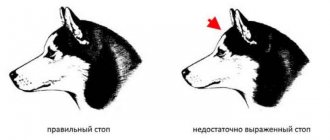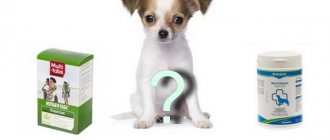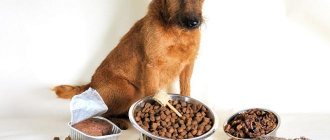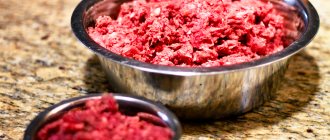The best food for a newborn puppy is its mother's milk. In addition to nutrients, it contains a huge amount of antibodies that babies need to protect themselves from illness. But time passes, they grow quickly, and mother’s milk becomes not enough. Usually the bitch feeds them for up to 1.5-2 months. But puppies need to introduce complementary foods much earlier, from about the third week of life.
Basic knowledge
The average fat content of a bitch's milk is 9-10%. The substitutes you choose should have exactly the same fat content or slightly less. Often, owners make a common mistake and start feeding their puppies too early. Often this is not necessary. If the puppies sleep most of the time and gain weight normally, then everything is fine and there is no need to get up at night with the intention of bottle-feeding them. Don't forget that a bitch produces as much milk as her puppies drink. That is, with supplementary feeding you will stimulate a decrease in its amount.
When to offer puppies a saucer
It depends on the specific situation. There are objective reasons why you need to supplement earlier. If the mother's milk supply is low or the litter is very large, goat's milk is the best choice. It is advisable to use raw, whole. You can add one yolk to a glass of milk. Before reaching four weeks of age, it is best to use quail eggs, and then add chicken eggs.
It makes sense to start feeding puppies at 14 days of age if weight gain has slowed down. If they continue to recover well, you can defer the introduction of additional feeds for another week. Or you can wait another week and start weaning on solid food from four weeks of age.
Second month of life
The beginning of complementary feeding for puppies marks a new stage in the lives of babies. Now they are less and less dependent on their mother and spend more and more time exploring the world around them. Starting from week 5, additional foods can be introduced into the diet, one every three days. It is very important to prioritize the range of meats. Veal is a choice for first feeding, but not the only one. The only limitation is fatty pork, as well as pieces of lamb with tail fat. By the way, fatty chicken is also prohibited; you need to choose a young bird or remove excess fat.
At this age, milk ceases to play a primary role in the lives of babies. Now it is gradually being replaced by fermented milk products. It is best to prepare them for puppies yourself. In this case, you can be confident in the quality of the finished product. At the same time, raw calcined foods are better absorbed, so you should give them preference.
The first foods for puppies are an introduction to basic foods. Therefore, take into account the tender stomachs of babies and give them food in small portions. This will avoid stomach problems, bloating and diarrhea. Like a small child, a puppy’s gastrointestinal tract is still imperfect.
What to feed a two month old puppy?
You're probably wondering at what age can you buy a puppy? There is no consensus on this matter. Some people think that it’s better early, while others believe that no earlier than 2-3 months after the end of the vaccination quarantine. Professional breeders can start selling puppies after activation, that is, at 45 days.
However, if the puppy is sold without a document, then you can buy it earlier. The owners begin to sell young animals at the age of one month. At the same time, some of them already feed babies from three weeks so that they themselves can eat from a bowl. When you bring the puppy into the house, you should prepare the necessary minimum of food for two to three days.
This list includes:
- rice/buckwheat/oatmeal;
- beef/chicken;
- beef tripe or other offal;
- pumpkin/carrot;
- cottage cheese and kefir;
- milk and semolina.
During the month, babies need to be fed every three hours, each time offering different dishes. Eg:
- 6.00 – semolina porridge;
- 9.00 – oatmeal with carrots and meat;
- 12.00 – cottage cheese with kefir;
- 15.00 – rice porridge with vegetables and offal;
- 18.00 – rice/buckwheat with meat and vegetables;
- 21.00 – semolina porridge.
Please note that all foods in the diet should be crushed as much as possible, but not in a blender, as the dog needs to learn to chew food. At first, the meat is given boiled, but after a week it can already be given raw in two out of three feedings. Food should be at room temperature or slightly warmer, but not cold or hot.
The dog at two months is strikingly different from what it was a month ago. And all thanks to the fact that he receives adequate nutrition. At this age, for harmonious development, the baby requires all the same products as in a month, but in twice the volume.
Keep in mind that at two months the puppy can already try sea fish and seafood, but only if he is not allergic to it. Milk and milk porridge should be present in the diet for at least four months, but its amount must be gradually reduced, replacing it with meat feedings.
It will be useful for every owner of a small puppy to know that most of the meat diet at two months is already given raw. But the pieces should not be large, since the baby still does not chew them, but swallows them whole and may choke. And besides, crushed food is better digested. But meat in the form of minced meat is not recommended, since it does not linger in the stomach and does not carry any nutritional value.
Do you know how many times to feed a puppy at two months of age? The number of feedings is already reduced by one, that is, food is given 5 times a day or every 4 hours.
Vitamins and minerals
When to start feeding puppies, each owner decides independently, focusing on their charges. If the mother feeds them well, then calmly enjoy a carefree life until they are 3-4 weeks old. But if the bitch does not have milk or, even worse, she gets sick or dies, then you will have to take care of feeding the babies.
From 6 weeks, puppies begin to be offered raw fish. It is a source of phosphorus and calcium. From this time you can begin to introduce vegetables and fruits into your diet. These are apples and carrots, lettuce and cucumbers, zucchini and pumpkins. Fish and meat bones can be fed to the puppy in ground form, mixed with meat. Do not forget that their share should not be more than 15%. You can and should give your kids large beef bones. This is a toy and a treat, and also a necessary thing for scratching growing teeth. But bones should only be given to well-fed puppies at night. At this age they are fed 6 times a day, and by 8 weeks the number of feedings is reduced to 3-4 times a day.
How to feed one-week-old puppies without a bitch?
Unfortunately, there are situations when the owner has to take on the role of the puppies’ mother, feeding them artificially. Feeding newborn puppies is not easy - you will have to devote all your time to this. Don't know how often you'll have to feed your babies? This will have to be done every two hours.
There are several options for feeding a puppy/puppies left without mother's milk:
- The easiest way to purchase is the so-called “bitch milk”, which is sold in powder form in packages of different capacities. The selected ingredients are as close as possible to the composition of the bitch's milk.
- The second option is to make your own formula for feeding puppies if you have cow's or goat's milk. To do this, take 3 yolks, a pinch of salt, a quarter teaspoon of vitamins (liquid) and a spoonful of corn oil per liter of milk. This mixture is brought to 35°C and fed to the puppies using a bottle with a pacifier. Babies are fed this way for up to three weeks, after which crushed regular food is gradually introduced.
From 8 weeks
By this time, the digestive system has time not only to form, but also to get stronger. Puppies can start giving offal. But you also need to choose them carefully. For example, the puppy will swallow chicken necks, but will gnaw on the backs. Tripe can also be given in the proportions recommended for adult animals. The frequency of feedings is now gradually decreasing, but the portion is increasing.
A baby at this age eats as much as an adult dog of the same breed, if you take the daily amount of food. Males always eat more than females. For normal digestion, you must add chopped fresh herbs. By this age, the number of feedings per day is reduced to three, but the diet should still include fermented milk products.
What should you not feed your puppy?
A puppy of any age, like an adult dog, should not be fed cold or hot food. In addition to this axiom, there is a list of foods prohibited for puppies:
- flour and bakery products;
- sweets;
- foods that cause fermentation (legumes, cabbage, plums, grapes);
- spices and herbs;
- roast;
- excess salt;
- sauces (ketchup, tomato, mayonnaise).
Important! Bones are not allowed in a puppy's diet. And not only chicken (tubular) ones. Any bones, especially when boiled, only cause harm. The exception is bone broths and sugar bones for puppies as entertainment.
Feeding Yorkshire puppies
Depending on the breed, the rules for introducing complementary foods may vary. This is especially true for miniature animals that are bred artificially. Tiny Yorkies quite often experience digestive problems. The stomach is often simply not able to digest the volume of food that the body needs due to its size. Therefore, special feeds are used for them, which, in a small volume, provide a good supply of nutrients.
Therefore, complementary feeding of a Yorkie puppy is most often carried out using soaked dry food “Starter Pappy”. Mash it with a fork until it becomes a paste. And when the kids grow up a little, they simply eat it soaked and wash it down with water. From two months you can switch to Mini Junior. Most breeders agree that this is the best feeding for Yorkies.
Large breed dogs
The most popular can be considered the German Shepherd. Complementary feeding of shepherd puppies begins from 18-20 days of life. These puppies are quite large and require a lot of calcium and nutrients to grow and develop. From this time on, calcined cottage cheese can be introduced. It performed very well in the combination “cottage cheese - milk - raw egg” or “cottage cheese - egg - carrot juice”. From day 22 you can add lean beef. To do this, it is scraped or ground in a blender. A good option would be a mixture of milk, cottage cheese and minced meat.
From about 26 days of life, milk porridge can be introduced into the diet. Cereals must be ground in a coffee grinder. Start with one cereal, and when your baby’s stomach gets used to it, you can add the next one.
Good puppy feeding: basic points
When choosing the type of dog food (dry food or natural food), follow the rule - do not overfeed! Overeating can have serious consequences. It’s not worth growing your pet’s stomach to a large size; overfeeding will lead to poor health, joint problems, which is especially important for large breed dogs), and diseases of the internal organs.
When can you feed puppies? Before bedtime, if the dog is hungry. Offer your pet milk porridge, pamper it with meat, but do not make the ritual daily.
Feeding the puppy natural food
Many owners choose how to feed their dogs natural products. The reasons for choosing are as follows:
- natural food is cheaper than buying ready-made food;
- natural food gives confidence in the quality of food.
There are also a lot of disadvantages to feeding “human” food: you have to often go to the store and prepare food, because during the growth period the animal eats a lot.
The main motto is “Only natural”, isn’t the prospect of standing near the stove for a long time scary? We recommend paying attention to the freshness of the products. Meat that tastes good at a low price will play a cruel joke on the health of an eared baby. Poisoning from low-quality products is not uncommon. Remember that a puppy is a small child, so it is important to take food responsibly.
Second rule: you cannot feed your dog from the table! Signature aromatic borscht, seasoned with sour cream, cabbage rolls prepared according to a family recipe will appeal to people, but not to the puppy, and will cause problems with his well-being!
What can you feed your little friend?
1) Milk
A puppy's diet up to 4 months includes milk. This product provides vital elements for the growth and development of a foolish baby. Offer it raw and cook milk porridge. Not every milk will do. Choose goat, you can’t go wrong - there are rarely allergies to it, and it is easier to accept by the body. Having trouble finding a goat? You can give cow's milk, but dilute it with water to avoid intestinal upset.
Closer to six months, the amount of milk is reduced and gradually eliminated, replacing it with fermented milk products.
2) Dairy products
Proper feeding of puppies consists of many factors, including fermented milk. Good digestion and enrichment of the body with calcium are a wonderful reason to buy your pet cottage cheese, kefir, and low-fat sour cream. Whey is one of the most useful products, containing a huge amount of useful substances. According to the degree of usefulness, hard cheeses are distinguished, which are easy to use as a reward during training.
3) Meat
It must be present in the daily menu, at least 40% of the total diet. You can give raw, frozen, boiled, scalded meat. The priority is still given to raw meat, because the predator is being raised. What species can be included in a puppy's diet?
- skinless chicken;
- turkey;
- veal;
- beef;
- horsemeat;
- offal (cooked, raw).
The meat is given, cut into cubes, but not minced.
4) Fish and seafood
Offer it to your puppy twice a week. Give preference to sea fish (river fish is often hazardous to health): squid, shrimp, mackerel, hake, pollock. Do not mix with meat feedings.
5) Vegetables
Teach your baby to vegetables: they contain many vitamins. Mix with cottage cheese, porridge, grind on a fine grater, serve as a puree or simmer - and you have delicious dishes that are easily digestible. Pumpkin, carrots, zucchini, beets, and greens (onions, parsley, spinach) are useful.
6) Berries, fruits
Undoubtedly, they are useful, so feel free to include them in the diet, especially if your dog likes to crunch on an apple. Beware of fruits with pits containing prussic acid. It is not advisable to give bananas; the fruit will cause rapid weight gain. Grapes and currants cause bloating and the accumulation of harmful substances in the body.
7) Cereals
Let's make a reservation right away: porridge for puppies is excluded as the main element of the menu. Cereals are good for digestion, but you should not feed a growing dog only cereals. And as an addition to a dairy-meat diet, they are ideal.
What kind of cereals will your furry baby like?
- semolina;
- buckwheat;
- rice;
- oatmeal
When adding a certain type of porridge to the menu, monitor the puppy’s condition; if there is an intestinal disorder, exclude this type for a while.
 Eggs
Eggs
They serve as an excellent source of protein; it is recommended to include egg yolk in the diet 2 times a week. The dog will like omelettes and eggs in their pure form. Quail eggs are ideal.
Feeding puppies food
How to properly feed a puppy with dry food is something every owner will think about when they decide to make food the main way of feeding their little four-legged friend. Many people worry that dry food contains few important substances for harmonious growth and development. Manufacturers year after year develop food that can satisfy a dog’s hunger, provide the animal with all the vital vitamins and minerals, and give the animal smooth, shiny fur and strong teeth. Dry food is properly balanced, food is easy to give, following the instructions for the daily intake.
How to properly feed a puppy?
It is recommended to give the baby food in a soaked form. Thirty minutes before the intended feeding, the granules are poured with warm water to swell. The use of broths for this purpose is excluded.
How many times should you give your puppy dry food per day? Follow the recommendations on the packaging. The dose should not be exceeded: there is a high risk of overdosing on nutrients. It is important for the owner to know that dry food is very high in calories and differs from natural food, so the dog must be given granules strictly according to the instructions.
There are situations that require switching a puppy from natural food to commercial food. This should be done gradually, without sudden jumps, consult your veterinarian first.
The Zoomix store offers dry food of existing classes: from economy options to super premium. We advise you to look for the following brands:
- Hill's;
- Royal Canin;
- Eagle Pack;
- Purina Proplan;
- Genesis;
- Diamond.
- Popular foods
- New
- Stock
NAW grain-free food for small breed puppies with turkey, duck and vegetables
NAW grain-free food for small breed puppies with turkey, duck and vegetables
Price: from 1806
NAW grain-free food for large breed puppies with turkey, duck and vegetables
NAW grain-free food for large breed puppies with turkey, duck and vegetables
Price: from 3117
GO grain-free dog food with whole chicken
GO grain-free dog food with whole chicken
Price: from 1033
Food GO (Go) for puppies and dogs with sensitive digestion with Pollock
Food GO (Go) for puppies and dogs with sensitive digestion with Pollock
Price: from 1309
Hill's Pouch for sterilized cats 6 months-6 years (salmon) SP Feline SCat YAdult Salmon
Hill's Pouch for sterilized cats 6 months-6 years (salmon) SP Feline SCat YAdult Salmon Before using this diet, we recommend that you seek advice from a veterinarian. • Precisely balanced...
Price: from 67
French bulldog/pug padding polyester
French bulldog/pug synthetic winterizer Brief description of the model: comfortable cuffs on the legs UNISEX overalls (a special hole is cut out for boys) fastener…
Price: from 1200
Dry dog food Purina Pro Plan Adult Small&Mini Sensitive Skin
Dry dog food Purina Pro Plan Adult Small&Mini Sensitive Skin Features of dry food for adult dogs PRO PLAN Adult Small & Mini Sensitive Derma: - “Sensi...
Price: from 340
TetraAqua AquaSafe
TetraAqua AquaSafe Water conditioner that converts aggressive tap water into fish-friendly water. Now with the addition...
Price: 144
Food for sterilized cats Eukanuba Adult Sterilized Weight Control balanced dry
Food for sterilized cats Eukanuba Adult Sterilized Weight Control balanced dry 100% balanced food, supports cat health in six key areas and provides excellent physical…
Price: from 265
TetraMin (flakes) 10l
TetraMin (flakes) 10 l The main food for a long and healthy life of all types of tropical fish. With a new formula for guaranteed* pure water.• With…
Price: 3468
TetraMin MiniGranules (small granules)
TetraMin MiniGranules (small granules) Basic food in granules for small ornamental fish * for small fish, such as barbs * slowly…
Price: 199
Dry food 1ST CHOICE, for older dogs with sensitive skin and hair (lamb with fish and rice)
Dry food 1ST CHOICE, for older dogs with sensitive skin and hair (lamb with fish and rice)
Price: from 1350
ALL PUPPY FOOD
How much food does a puppy need?
For medium and large breed puppies, there is a clear formula: they need 5 to 8% of their body weight. Moreover, this portion is adjusted once a week. But the main guideline remains the condition of the puppy. He shouldn't get fat or look thin. You can focus on the ribs. They should not bulge, but upon palpation they can be easily felt. If the puppy is cheerful, runs around a lot and is interested in the world around him, he will definitely have a good appetite. At the same time, it is necessary to provide him with high-quality food, complete sources of all necessary nutrients.










